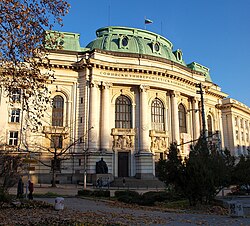
Back التعليم في بلغاريا Arabic Образование в България Bulgarian Bildungssystem in Bulgarien German ബൾഗേറിയയിലെ വിദ്യാഭ്യാസം Malayalam Educação na Bulgária Portuguese Образование в Болгарии Russian Utbildning i Bulgarien Swedish Освіта в Болгарії Ukrainian Bolgariyada taʼlim Uzbek
This article includes a list of general references, but it lacks sufficient corresponding inline citations. (March 2017) |



Education in Bulgaria is guided and overseen by Bulgarian Ministry of Education and Science. Compulsory education includes three years of pre-primary education, primary education, and secondary education.[1][2] The schools start by age of seven and end the age of 18. Compulsory education at state schools is free of charge. The state and private higher education schools, colleges and universities charge fees, although they offer students scholarships.
In 1998 enrollment in the primary grades was 93 percent of eligible students, and enrollment in the secondary grades was 81 percent of eligible students. With the gender ratio of female to male students in primary schools was 0.97, and the ratio in secondary schools was 0.98. Because of the prior Bulgaria's low birthrate during the postcommunist period, total primary and secondary school enrollment was in a slightly decreased level in the beginning of the post-communist period, that was causing some reductions in teaching staff and facilities. But at the same time, private schools and colleges appeared and their number quickly increased by 10 times during the 1990s. Bulgaria's higher education system was reorganized in the mid-1990s. Between 1995 and 2002, the number of university graduates increased from 33,000 to 50,000. In 2002 in higher learning 42 universities and colleges were in operation, and 215,700 students were enrolled. In 2003 some 4.9 percent of Bulgaria's national budget was devoted to education.[citation needed]
The Human Rights Measurement Initiative (HRMI)[3] finds that Bulgaria is fulfilling only 75.7% of what it should be fulfilling for the right to education based on the country's level of income.[4] HRMI breaks down the right to education by looking at the rights to both primary education and secondary education. While taking into consideration Bulgaria's income level, the nation is achieving 62.1% of what should be possible based on its resources (income) for primary education and 89.3% for secondary education.[4]
- ^ "Home".
- ^ "Bulgaria | NON-STATE ACTORS IN EDUCATION | Education Profiles".
- ^ "Human Rights Measurement Initiative – The first global initiative to track the human rights performance of countries". humanrightsmeasurement.org. Retrieved 2022-03-13.
- ^ a b "Bulgaria - HRMI Rights Tracker". rightstracker.org. Retrieved 2022-03-13.